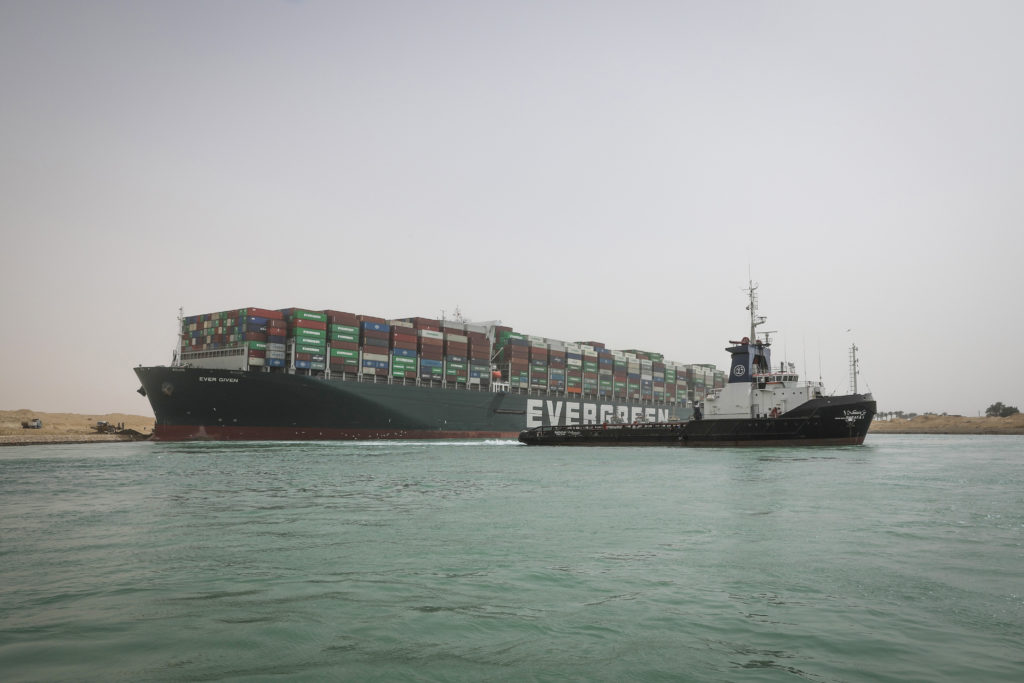The economic damage started as soon as the Japanese-owned cargo ship Ever Given became stranded sideways in the Suez Canal on Tuesday. Every day it stays stuck there, around £7bn of goods are held up by ships unable to use the shortcut, working out to £290m an hour.
But let’s face it: most people aren’t weeping for the lost trade. There’s a bubbling sense of unconcealed mirth around the incident.
It helps that the boat looks like a car that got stuck trying to do a three-point turn. But it’s not just that. The sight of the ship – awkwardly stuck in place, holding up billions in trade – feels like a kind of symbolic victory against the hubris of humankind.
There’s something reassuringly simple about the Ever Given incident. Not so long ago, things used to make intuitive sense. Newtonian physics and even the theory of relativity could be described through metaphors of the objects around us. If you put a bowling ball on a stretched out sheet, it caused a deeper well than a tennis ball. That’s gravity. Fine, now you basically understand it.


But then quantum mechanics came along and seemed to defeat the very concept of metaphor. No matter which way it was described to us, it was impenetrable.
The same applies to the economy. We used to imagine people making things and then selling them at home or trading them abroad. Then financial services became dominant and this was replaced by terms like repo trading, or by concepts like gambling against your preferred outcome as a way of mitigating potential losses. What felt firm and practical became abstract. Even the basic notion of taking a loan to buy a house suddenly mutated into bizarre and incomprehensible investment assets, composed of things like collateralised debt obligations. And these assets, of course, brought the world to its knees.
The joy of Ever Given is that it is basic. Something got stuck and now everything else has to go around it. It is the exact equivalent of a car getting stuck on a road into town and traffic having to go the long way around, except this time the long way around involves detouring round the southern tip of Africa.
That speaks to the Heath Ledger Joker in all of us. You can make these systems as complex as you like. They can involve billions of producers and consumers, in trade networks spanning the globe, under insanely detailed layers of national and international standards and regulations. But then a ship gets knocked about a bit and now suddenly everything is stuck. Twelve per cent of global trade is now stalled because of a gust of wind.
But it’s a fake victory. The Ever Given doesn’t really represent simplicity. It just looks like it does. It actually represents complexity.
It is the chaos agent. It shows that no matter how you build your system, something strange and unaccounted for can come and bring it down. A gust of wind, the behaviour of an individual, a physical accident.
This works for good or ill. Take September 11th. Imagine the extent of security and military preparation baked into the US defence system: arguably the most advanced in the history of humankind. And yet all it took was a few men with stanley knives to bring it down – no cyberwarfare, no costly weapons, no nuclear technology.
Think of the extent of thought and application put into the process of science. And yet many of its most useful discoveries – penicillin, X-rays, even microwave ovens – happened by accident. If Alexander Fleming had been a bit more orderly in his work – if he’d remembered to cover up a culture plate of bacteria – we might never have discovered antibiotics.
The same is true in politics, where the plans and systems we put in place are constantly on the verge of collapse from random, unexpected events. Take Brexit. The British relationship with Europe had been painstakingly built up through decades of close interconnected work on trade and law. Concern about the relationship with Europe was very low among the British public. Then one day David Cameron thought announcing a referendum would help him out in upcoming local elections. And now we are where we are now: severed trading and diplomatic networks, the collapse of the political class, the redrawing of British political loyalties, people losing jobs, uncertainty in Ireland, the firm possibility of Scottish independence.
We’re all at the mercy of chaos. Of course, you can bake this into your systems. You can try to account and prepare for unlikely or unexpected events. The difference in government performance across the world in relation to covid is partly a reflection of that. But you can never eliminate it entirely. That’s the Ever Given truth: No matter how sophisticated your system, you’re only ever one gust of wind away from it all falling apart.

